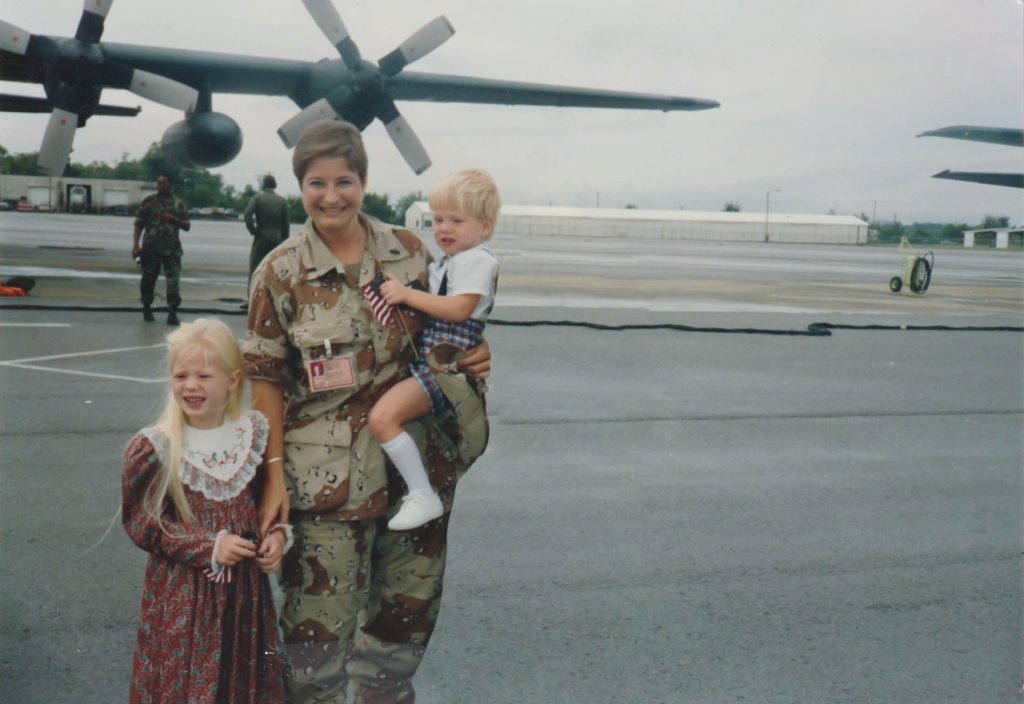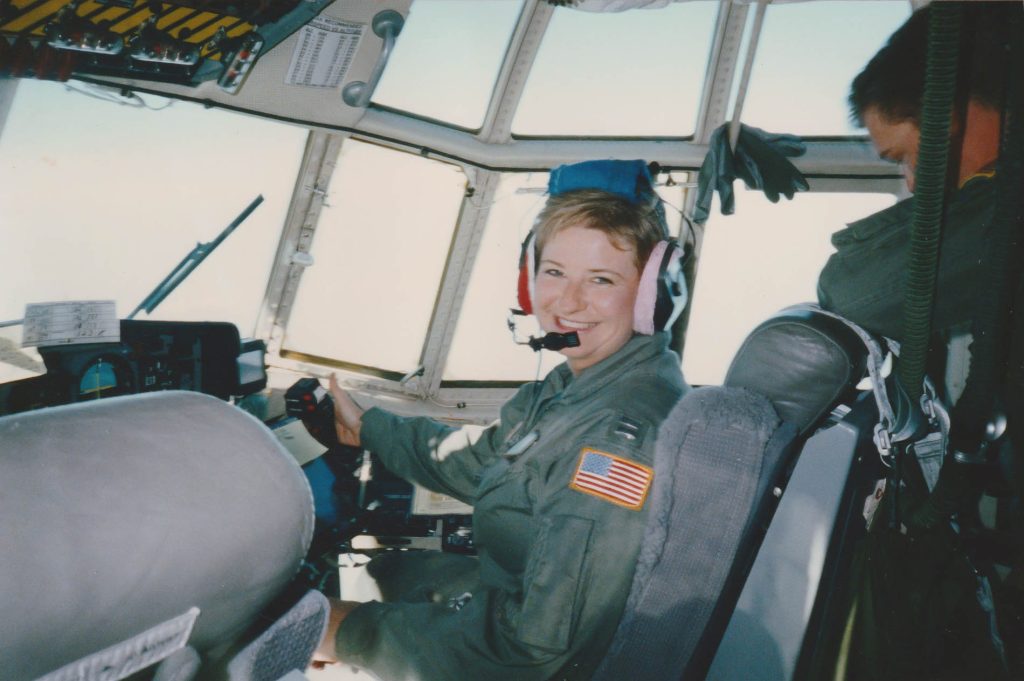U.S. Air Force Capt. Kathy Cason Johnson has made a life-saving difference to her nation
Kathy Cason Johnson grew up with a big heart and put it to work in her chosen field as a nurse, but it was a shocking tragedy that ignited an even deeper passion in her for saving lives, mending the wounded, and caring for the dying—not only in her home community of Knoxville but to the far reaches of the globe.
On Sunday, October 23, 1983, Johnson was a 29-year-old registered nurse (RN) who had worked at East Tennessee Children’s Hospital (ETCH) for the past eight years; she had wed a physician she met at the hospital.
That morning, two truck bombs plowed into the barracks in Beirut, Lebanon, that housed U.S. and French military members of a multinational peacekeeping force. The largest non-nuclear explosion since World War II and the deadliest single-day attack against U.S. Marines since Iwo Jima, the bombing killed 241 American and 58 French service personnel. Footage of the chaotic aftermath as mangled bodies were stretchered from the smoldering rubble flickered on TV screens in American homes. President Ronald Reagan took to the airwaves to voice “sorrow and grief” and “the outrage of a nation.”
In Knoxville, Johnson felt all of those sentiments and more. “I watched that on the news, and it weighed heavy on my heart,” she recalls. “Seeing some of the injuries and listening to the reports, it looked like there were not a lot of medical resources to help these guys. I kept envisioning: what if I was in a position to fly in and render aid and get them back home? They needed comfort and medical attention.”
That event served as a catalyst that created “a sense of urgency” for Johnson to embark on a second phase of her nursing career: nine-plus years of military service that would include harrowing missions during the first Gulf War; flying into remote bases to treat and evacuate injured soldiers; lunching and swimming with a Saudi princess; rubbing elbows with Bob Hope, Katie Couric, Bryant Gumbel, and Geraldo Rivera; wrapping herself in Christmas lights to brighten the spirits of a plane filled with patients; and more.

Along the way, Johnson would become known not only for her heart of compassion, courage, and coolness under fire, but also for her gift of humor that brought smiles and laughter to the faces of those who were risking their lives to engage enemy forces.
‘A True Love of Mine’
A graduate of Powell High School’s class of 1972, Johnson wasn’t set on a specific career path. She thought about studying journalism at UT-Knoxville and took a few summer courses before her father encouraged her to pursue nursing. “He saw something in me, maybe that I was compassionate and liked to take care of things.”
It didn’t take long during her training at Fort Sanders and then her work at Children’s Hospital for Johnson to become enamored with her profession. “Nursing was a true love of mine and I became passionate about it,” she says. She was a duck in water.
After Beirut, her path toward military nursing provided a timely boost, blending her caring expertise with a sense of patriotism and the underlying belief that God was leading her into a new realm of serving others.
In 1985, she was commissioned after having attended Military Indoctrination for Medical Service Officers (MIMSO), several weeks of training, followed by six weeks of flight-nurse school in San Antonio. She emerged as an officer assigned to the U.S. Air Force’s 118th Aeromedical Evacuation Squadron (AES) out of Nashville’s Berry Field and the Tennessee Air National Guard.
Johnson would drive the few hours from Knoxville on many weekends to earn her flight-training hours, learning to transport sick and injured patients from, say, a tent or a bus on the battlefield into a C-130 Hercules plane or a helicopter. “We trained in chemical warfare, survival skills,” and more, she says. She also trained to become an instructor.
Fast-forward to 1990, when tensions in the Middle East flared into what became Operation Desert Shield and then Desert Storm, and Johnson was deployed to Camp Bedrock, a tent city in Dhahran, Saudi Arabia. She landed in a civilian plane, looking out the window wide-eyed at the unfamiliar terrain.
“Here I was, an East Tennessee girl used to green trees and lakes,” Johnson says. “I had never seen a desert. We were told to lower our window shades, and suddenly I heard people storming onto the aircraft, guns drawn, yelling in a foreign accent, ‘Put your heads down!’ It was scary. I thought we had landed in Iraq by mistake, but it was just Saudi troops doing routine security, checking our papers. We got off and were taken to the American side of the base.”

After that jolting welcome, Johnson began to adjust to base life and quickly endeared herself to fellow medical personnel, patients, and the Saudi hosts, while taking part in critical air-evac missions. “We would fly out of Dhahran, go to Bahrain to pick up patients, fly over to Dubai, to other cities along the border of Iraq, make multiple stops, and then go to hospitals in Germany” when patients needed advanced treatment. She worked with patients both on the field, in a Mobile Aeromedical Staging Facility (MASF), and in the aircrafts.
Because of her depth of nursing experience in emergency settings back in Knoxville, Johnson wasn’t fazed much by the injuries and deaths she encountered. The biggest differences between civilian and military life, she says, were flying within range of scud and Patriot missiles, coupled with the constant threat of chemical warfare and the fear of terrorists attacking a base.
“It was tense. We were always on alert for chemical attacks,” she says. “When alarms would go off, everything came to a stop, we would evac quickly to get out of a region, or take cover in the sandbags for protection.”
Her encounters with Iraqi soldiers harken back to a previous Cityview veteran profile in which Knoxville’s Norris Hill described meeting a young male fighter who was surrendering and bracing to be killed by American troops, only to be provided with food, water, and medical care.
Saddam Hussein “had his Royal Army hidden in bunkers in the sand,” Johnson says. “A lot of those were teens. They would walk out malnourished and dehydrated. We treated them, picked them up. They never refused treatment, because they could see we were there to help them.”
During her tenure, Johnson also was stationed at Mirage Air Base in Sharjah, the United Arab Emirates (UAE), where she served as officer in charge of the medical unit; and she worked out of Kapaun Air Station in Germany.
Dedication and Love
At the time she was deployed to the Gulf, Johnson was a single mom with two children, ages 5 and 3, and she battled the balance between duty to country and love for her little ones. “That was a real tough pull on my heart and mind,” she recalls. “I was dedicated to the military and to my children. I didn’t want to leave them behind.” She is thankful that her church family in Louisville (TN), her father, and a nearby aunt rallied to care for the kids.
When acknowledging the toll that deployment takes on mothers—thousands of them served in the Gulf and later in Iraq and Afghanistan, and some 10 percent of all veterans are women—Johnson also expresses empathy for the fathers she worked with and treated, including some single dads. “They experienced some of the same issues, but the male soldiers had different emotional worries,” she says. “They missed their families, and financially, they still had house payments and bills to pay. They would take a cut in pay to be deployed versus their regular job if they weren’t active duty.”
That note of empathy from Johnson is not surprising in light of her bent toward compassion and caring. Even when talking about times when her swift actions have made a critical difference—back home, she had received commendations for administering life-saving treatment to heart-attack victims in a courtroom and at West Town Mall—she is quick to deflect praise and credit others for helping to shape her into who she is.
To that end, when asked to assess the impact of her nursing career, she reels off the names of mentors who she says played key roles in her achievements.
“Lonna Lindsay RN, now retired, was director of the Children’s Hospital ER; she set the bar for excellence in care and took me under her wing to excel,” Johnson says, “along with Teresa Hutchins RN, who is now deceased, Anita Courtney RN, and Rick Leeper RN, all at Children’s. My mentors in the Guard included Major Lynn Chapman, Colonel Norman, Colonel Wright, and Chief Cundall. They were instrumental in my professional growth, accountability and commitment.”
One of the key takeaways she learned from all of those military mentors was: “Always be resourceful.” Johnson took that message to heart on many occasions, like when she would sweet-talk the crews of civilian flights landing at her bases into supplying bags of extra ice that she would share with fellow soldiers. “That’s the one thing I missed most about being on base: there was no ice—none!” she recalls with a smile. “They even nicknamed me ‘The Ice Lady’ on the flight line.” And the time during the holidays when she turned an Aerovac flight of patients into a yuletide celebration: she wrangled a string of Christmas lights to wrap herself in and played a cassette tape of carols over the plane’s PA.
Standing for Freedom
After the Gulf War ended, Johnson returned to her job at Children’s Hospital—“they were so very supportive of me” during her military leave, she says—while remaining in the Guard until her honorable discharge in 1994. Having served in the military, Johnson “took pride in wearing that flight suit or dress blues. When people would see you in the community, it was always ‘thank you for serving.’” Choosing to enter the military “was really good for me; it taught me to be more committed, organized, and even more grateful for our country as a society that welcomes freedoms and stands up for them. I am more appreciative of what we have here in America. It also made me a better person and a better mother.”
Kathy and her husband of twenty-eight years, Randy, have five children between them and 10 grandchildren, all but one of whom live in the Knoxville area. The Johnsons make their home on a lake. “It’s real serene, kind of rural; I’m enjoying my little peaceful life,” she says.
One of her children, son Will Cason—who followed in her footsteps and works as a physician assistant at Children’s Hospital today—met his mom in Washington, DC, last November when she visited as part of the first all-female Honor Air Flight out of Tennessee. The trip has become one of her most cherished memories.
“The emotional impact of [Will’s presence], touring with me and giving me the opportunity to share stories and adventures, along with being there with other female veterans, seeing the Women’s Memorial, and overlooking Arlington National Cemetery—it was a very special time,” she says with yet another trademark smile on her face.
In light of all the “special time” her service has provided for her fellow soldiers, Children’s Hospital teammates, and countless patients—many of whom owe their very lives to her excellent care—one can’t help but smile along with Capt. Johnson to see her basking in such a joyous experience.

Comments are closed.